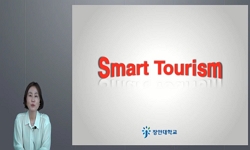Smart tourism, which naturally began to attract attention according to the trend of the times,has become an object that provides important experiences to tourists. Accordingly, many citiesare making various attempts to provide smart tourism experience...
http://chineseinput.net/에서 pinyin(병음)방식으로 중국어를 변환할 수 있습니다.
변환된 중국어를 복사하여 사용하시면 됩니다.
- 中文 을 입력하시려면 zhongwen을 입력하시고 space를누르시면됩니다.
- 北京 을 입력하시려면 beijing을 입력하시고 space를 누르시면 됩니다.

가치-태도-행동(VAB) 체계의 확장을 통한 스마트 관광에 대한 지지도 분석 = An Analysis of Support toward Smart Tourism through the extension of Value-Attitude-Behavior(VAB) hierarchy
한글로보기https://www.riss.kr/link?id=A109245752
- 저자
- 발행기관
- 학술지명
- 권호사항
-
발행연도
2024
-
작성언어
Korean
- 주제어
-
등재정보
KCI등재
-
자료형태
학술저널
-
수록면
143-165(23쪽)
- DOI식별코드
- 제공처
-
0
상세조회 -
0
다운로드
부가정보
다국어 초록 (Multilingual Abstract)
Specifically, we examined the influence relationship between memorable tourism experiencesthrough smart tourism, experience value, two-dimensional attitude (smart tourism, smart tourismcity), behavioral intention, and support. The results of structural equation modeling analysis are asfollows. First, it shows that memorable tourism experiences are positively related to experientialvalue. Second, experiential value was found to have a positive effect on attitude toward smarttourism. Third, attitude toward smart tourism had a positive effect on attitude toward smart tourismcity, whereas experiential value did not have a significant effect on attitude toward smart tourismcity. Fourth, attitude toward smart tourism city had a positive effect on behavioral intention,whereas attitude toward smart tourism did not have a meaningful effect on behavioral intention.
Fifth, behavioral intention was found to be positively related to support. As a result, it will beimportant to build a smart tourism environment to strengthen the competitiveness of urban tourism.
Afterwards, specific academic and practical implications of this study are described in detail in theconclusion section.
Smart tourism, which naturally began to attract attention according to the trend of the times,has become an object that provides important experiences to tourists. Accordingly, many citiesare making various attempts to provide smart tourism experiences (e.g., smart tourism citydevelopment projects). In this situation, this study structurally examines the causal relationshipregarding smart tourism experiences by extending the value-attitude-behavior (VAB) hierarchy.
Specifically, we examined the influence relationship between memorable tourism experiencesthrough smart tourism, experience value, two-dimensional attitude (smart tourism, smart tourismcity), behavioral intention, and support. The results of structural equation modeling analysis are asfollows. First, it shows that memorable tourism experiences are positively related to experientialvalue. Second, experiential value was found to have a positive effect on attitude toward smarttourism. Third, attitude toward smart tourism had a positive effect on attitude toward smart tourismcity, whereas experiential value did not have a significant effect on attitude toward smart tourismcity. Fourth, attitude toward smart tourism city had a positive effect on behavioral intention,whereas attitude toward smart tourism did not have a meaningful effect on behavioral intention.
Fifth, behavioral intention was found to be positively related to support. As a result, it will beimportant to build a smart tourism environment to strengthen the competitiveness of urban tourism.
Afterwards, specific academic and practical implications of this study are described in detail in theconclusion section.
동일학술지(권/호) 다른 논문
-
주거기능 도입을 위한 준공업지역의 정비 연구- 대구광역시를 중심으로 -
- 경남대학교 산업경영연구소
- 류경수
- 2024
- KCI등재
-
호모 데우스(homodeus) 관점의 인간의 삶과 죽음 그리고 관광활동에 관한 연구
- 경남대학교 산업경영연구소
- 양진연
- 2024
- KCI등재
-
대학생의 인터넷전문은행 예․적금상품 선호도에 대한 컨조인트 분석
- 경남대학교 산업경영연구소
- 임양환
- 2024
- KCI등재
-
에너지 안보와 무역이 국가 경쟁력에 미치는 영향에 관한 연구
- 경남대학교 산업경영연구소
- 홍란주
- 2024
- KCI등재




 KISS
KISS



